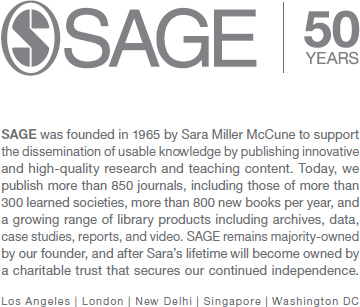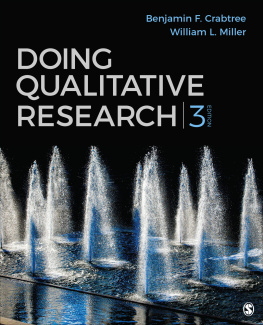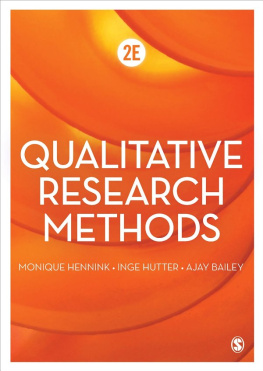Qualitative Research
We dedicate this book to
Our Children:
Maxwell and Evelyn, who were born during the writing of this book.
Ari and Lev, who continued to grow, teach, and learn as we wrote.
We hope this book will contribute to your generation and beyond
through the good work of those who read this and use research as a tool
to help heal our world.
And to Our Students:
Whose questions, passions, concerns, and commitments have shaped this book beyond words. Thank you for your engaging learning, your curiosity, and for being our teachers.
Curiosity as restless questioning, as movement toward the revelation of something hidden, as a question verbalized or not, as search for clarity, as a moment of attention, suggestion, and vigilance, constitutes an integral part of the phenomenon of being alive. There could be no creativity without the curiosity that moves us and sets us patiently impatient before a world that we did not make, to add to it something of our own making.
Paulo Freire, Pedagogy of Freedom
Qualitative Research
Bridging the Conceptual, Theoretical, and Methodological
- SHARON M. RAVITCH
- University of Pennsylvania
- NICOLE MITTENFELNER CARL
- University of Pennsylvania
FOR INFORMATION:
SAGE Publications, Inc.
2455 Teller Road
Thousand Oaks, California 91320
E-mail: order@sagepub.com
SAGE Publications Ltd.
1 Olivers Yard
55 City Road
London EC1Y 1SP
United Kingdom
SAGE Publications India Pvt. Ltd.
B 1/I 1 Mohan Cooperative Industrial Area
Mathura Road, New Delhi 110 044
India
SAGE Publications Asia-Pacific Pte. Ltd.
3 Church Street
#10-04 Samsung Hub
Singapore 049483
Copyright 2016 by SAGE Publications, Inc.
All rights reserved. No part of this book may be reproduced or utilized in any form or by any means, electronic or mechanical, including photocopying, recording, or by any information storage and retrieval system, without permission in writing from the publisher.
Printed in the United States of America
ISBN 978-1-4833-5174-2
This book is printed on acid-free paper.
Acquisitions Editor: Vicki Knight
Editorial Assistant: Yvonne McDuffee
eLearning Editor: Katie Bierach
Production Editor: Libby Larson
Copy Editor: Gillian Dickens
Typesetter: C&M Digitals (P) Ltd.
Proofreader: Dennis W. Webb
Indexer: Wendy Allex
Cover Designer: Leonardo March
Marketing Manager: Nicole Elliott
Detailed Contents

Foreword
Frederick Erickson
Qualitative research is not magic, but it is sometimes done as sleight of hand, as if to pull a rabbit out of a hat. And like the stage performance of a skilled magician, each successive flourish can appear easy to accomplish, from the point of view of the audience. Yet much is going on behind the scenes that the audience does not see. Explaining the backstage aspects of qualitative inquiryits fundamental aims and conductcan be done either simplisticallycookbook fashion, which makes it look deceptively simple and straightforwardor with elaborate complexityinvoking unexplained distinctions in epistemology, ontology, and axiology in impenetrable discourse that mystifies the reader. What this book achieves is something quite different: it presents qualitative inquiry as a deliberative enterprise that is careful in its rationales, in its ethics, and in its handling of evidence and representation, discussing these matters with clarity, cogency, and subtlety.
Bridging, a term used in the subtitle of the book, is an image of connection, and this book certainly accomplishes that, making connections horizontally and vertically. Horizontal connections manifest across successive chapters, from initial consideration of the purposes and intellectual foundations of qualitative inquiry (essays in methodology as distinct from method), through discussion of methodsvarious research tools, and various aspects of relationship between researchers and those who are studied, concluding with discussion of data discovery, data analysis, and writing, with thoughtful consideration of choices involved in narrative reporting; representations of the everyday practices and meaning perspectives of those who are being studied.
Vertical connections also manifest within each chapter of the book, across differing expository voices. There is the voice of the authors, who write from within their considerable experience in conducting qualitative inquiry and teaching others how and why to do it. There are also voices of students, who write from within their experience of beginning to learn qualitative inquiry and finding that this is not as easy as it might have looked at first glance. In addition, there are the voices of other scholars who do qualitative inquiry and write about how it is done well. This three-layered combination of voices, some very junior in experience and others very senior, constructs an especially rich conversation among diverse participants in differing communities of the practices of qualitative inquirya conversation that draws the reader into dialogue with the text as a fourth voice; a fourth layer in the conversation.
The extensive presentation of instructional exercises and examples of students work makes this book pedagogically unusual, and perhaps unique. The breadth and currency of literature review, connecting this books discussion with wider conversations among classic and contemporary writers who address qualitative inquiry approaches, make this book substantively rich.
Just as I do when I review fieldnotes or watch video clips or listen to audio recordings of interviews again and again, so as to apprehend, reflect upon, and digest their contents more and more thoroughly, so I read a book like this iteratively. I invite the reader to do the same. Read the whole book once. Then read it again. After that, begin to review single chapters repeatedly. Take some time to hunt down the writing of various authors who have been cited. Then go back to the chapter in which that citation appeared. Whether you are an experienced qualitative researcher or a beginner, you will find that this ruminative approach pays off, in fresh ideas and in deeper insights into what you may already know. After a few years, come back to this book again. You dont get it all at once.
Preface
Reading This Book: A Note to Students
Welcome students.
This book is written with you in mindyour learning goals and needs, your backgrounds, interests, the contexts of your learning, and possibly your anxieties, concerns, and desire for balance between theory and action as you learn about qualitative research. We seek to support you as you endeavor to learn about qualitative research and about becoming a qualitative researcher. Our overarching goal is to provide you with a solid understanding of what qualitative research is and how to do it with focus and rigor. This book seeks to help you cultivate and integrate theoretical, methodological, and conceptual knowledge; to help you see their interaction; and to help you understand the central concepts, topics, and skills you need to engage in rigorous, valid, and respectful qualitative research.












